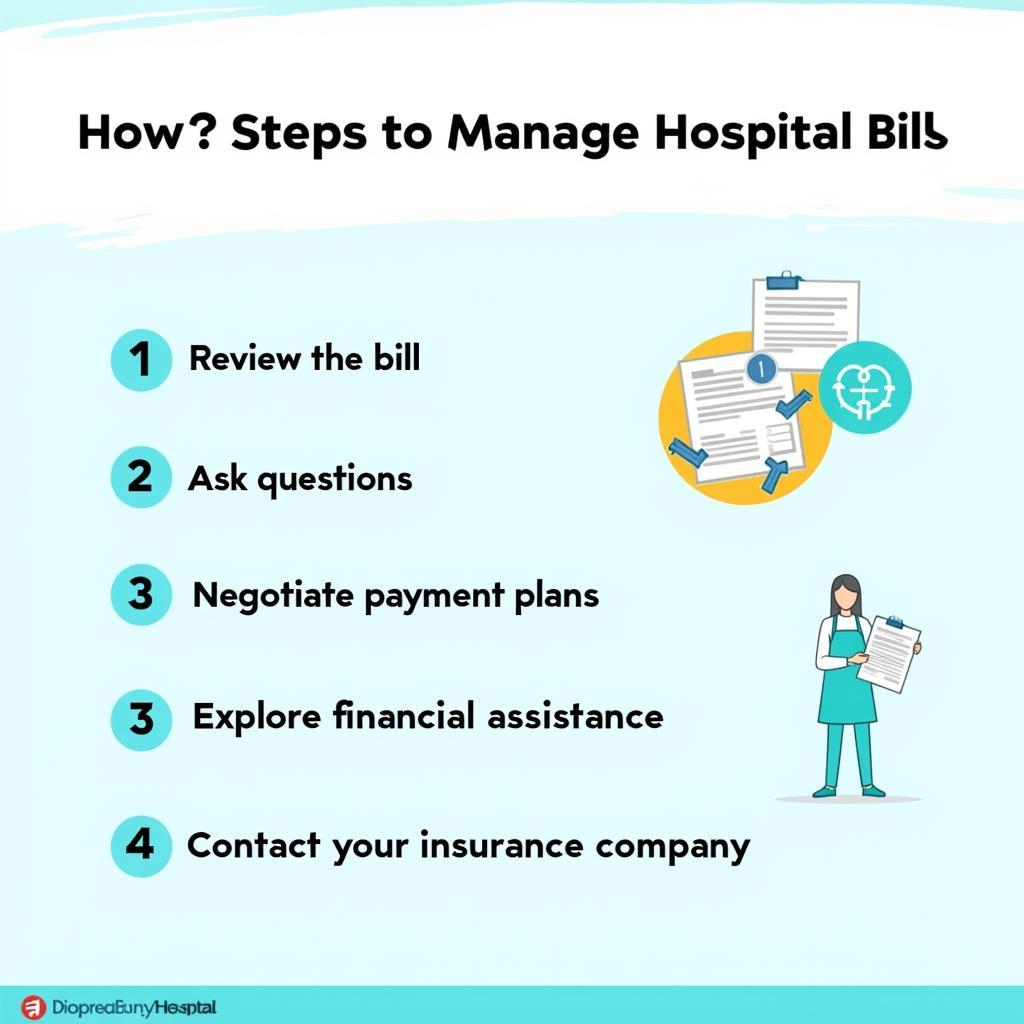Navigating the complexities of a hospital bill receipt in the USA can be daunting. This comprehensive guide will break down the key components of a typical US hospital bill, explain common charges, and offer practical advice for managing your healthcare expenses.
Decoding Your Hospital Bill Receipt
Understanding your hospital bill receipt is crucial for managing your healthcare finances. A typical US hospital bill can seem like a foreign language, filled with codes, abbreviations, and confusing terminology. Let’s demystify this document and empower you to take control of your medical expenses.
Common Charges on a Hospital Bill
Hospital bills typically itemize charges for various services and supplies. These can include room and board, physician fees, medications, laboratory tests, imaging studies (like X-rays and MRIs), operating room charges, anesthesia, and other miscellaneous expenses.
- Room and Board: This covers the cost of your hospital stay, including your room, meals, and basic nursing care.
- Physician Fees: These are separate charges for the doctors who provided your medical care.
- Medications: This includes the cost of any drugs administered during your hospital stay.
- Laboratory and Imaging Tests: This covers the cost of tests like blood work, urinalysis, X-rays, CT scans, and MRIs.
Understanding Medical Codes and Abbreviations
Hospital bills often use medical codes and abbreviations, which can be confusing for patients. These codes are used for billing and insurance purposes. Common coding systems include ICD-10 (International Classification of Diseases, 10th Revision) for diagnoses and CPT (Current Procedural Terminology) for procedures.
- ICD-10 Codes: These codes classify diseases, injuries, and other health conditions.
- CPT Codes: These codes describe medical, surgical, and diagnostic services.
Tips for Managing Your Hospital Bill
Managing your hospital bill effectively can help you avoid financial stress. Here are some practical tips:
- Review Your Bill Carefully: Check for any errors or discrepancies.
- Ask Questions: Don’t hesitate to contact the hospital billing department if you have any questions about your bill.
- Negotiate Payment Plans: If you’re unable to pay your bill in full, explore payment plan options with the hospital.
- Explore Financial Assistance Programs: Many hospitals offer financial assistance programs for patients who qualify.
- Contact Your Insurance Company: Verify your coverage and understand your out-of-pocket responsibilities.
What if I Can’t Afford My Hospital Bill?
If you’re facing financial hardship and struggling to pay your hospital bill, consider the following options:
- Financial Assistance: Many hospitals offer financial assistance programs to patients who meet certain income requirements. Contact the hospital’s financial aid office for more information.
- Negotiating a Payment Plan: Speak with the hospital’s billing department to discuss setting up a manageable payment plan.
- Medicaid and Other Government Programs: Explore eligibility for government programs like Medicaid or CHIP, which provide healthcare coverage for low-income individuals and families.
 Tips for Managing Hospital Bills Effectively
Tips for Managing Hospital Bills Effectively
Conclusion
Understanding your hospital bill receipt in the USA is essential for managing your healthcare expenses. By familiarizing yourself with the key components of a hospital bill and following the tips outlined in this guide, you can navigate the billing process with confidence and take control of your financial well-being. Remember to review your bill carefully, ask questions, and explore all available options for managing your healthcare costs. If you need further assistance with your hospital bill receipt, don’t hesitate to contact us.
FAQ
- What is an EOB (Explanation of Benefits)? An EOB is a statement from your insurance company explaining what services were covered and how much you owe.
- How can I dispute a charge on my hospital bill? Contact the hospital billing department and explain the reason for the dispute.
- What are the different types of hospital billing codes? Common codes include ICD-10 for diagnoses and CPT for procedures.
- How long do I have to pay my hospital bill? The payment deadline varies depending on the hospital and your agreement with them.
- What happens if I don’t pay my hospital bill? The hospital may send your account to collections, which can negatively impact your credit score.
- Can I get a detailed breakdown of my hospital bill? Yes, contact the hospital’s billing department to request an itemized bill.
- What are common mistakes to look for on a hospital bill? Look for duplicate charges, incorrect codes, and charges for services you didn’t receive.
Need more information? Explore our other articles on healthcare finances and insurance.
Need support? Contact us at Phone Number: 02437655121, Email: [email protected] Or visit us at: No. 298 Cau Dien Street, Minh Khai, Bac Tu Liem, Hanoi, Vietnam. We have a 24/7 customer service team.